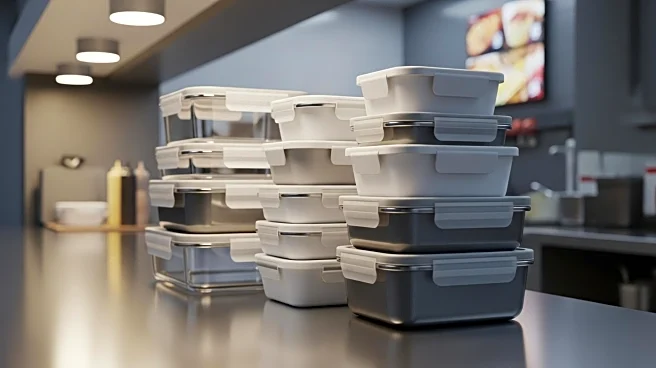What's Happening?
The fast-food industry is undergoing a significant transformation as it moves away from single-use disposables towards reusable packaging models. This shift is driven by growing environmental concerns, consumer willingness to engage in take-back and refill schemes, and regulatory pressures to reduce plastic waste. According to Persistence Market Research, the global fast-food reusable packaging market is expected to expand from $17.21 billion in 2023 to $33.96 billion by 2030, with a compound annual growth rate of 10.2%. Major fast-food chains are piloting programs that involve cleaning, sanitizing, and reintroducing packaging, which not only reduces waste but also aligns with corporate ESG goals and resonates with sustainability-conscious consumers.
Why It's Important?
The move towards reusable packaging in the fast-food industry is significant as it addresses critical environmental issues and aligns with regulatory mandates. This transition is expected to reduce plastic waste and lifecycle emissions, offering long-term cost savings for businesses. It also enhances brand image and compliance with evolving legislation. The adoption of reusable packaging models supports broader circular economy goals, creating shared value for businesses, customers, and ecosystems. As governments impose extended producer responsibility policies and penalize excessive waste, the market for reusable packaging is poised for substantial growth, particularly in regions like Europe and North America.
What's Next?
The fast-food industry is likely to see increased adoption of reusable packaging systems, driven by government bans on single-use plastics and consumer demand for sustainable dining options. Technology-driven tracking systems, such as RFID and QR codes, are expected to enhance packaging return rates and operational efficiency. Collaborative pooling systems may gain traction, enabling shared packaging inventories across chains. As the market expands, there is potential for growth in emerging economies, where fast-food outlets face rising waste management costs. Partnerships with cleaning service providers and packaging pool operators could unlock broader market access.
Beyond the Headlines
The shift to reusable packaging in the fast-food industry could have deeper implications, including changes in consumer behavior and dining habits. As brands adopt reusable models, they may need to invest in infrastructure for cleaning and logistics, which could pose challenges for smaller chains. Additionally, consumer compliance in returning packaging promptly could affect scalability in certain regions. The integration of digital tracking tools and app-based return rewards may simplify participation and enhance inventory management, further supporting the industry's transition to sustainable practices.









